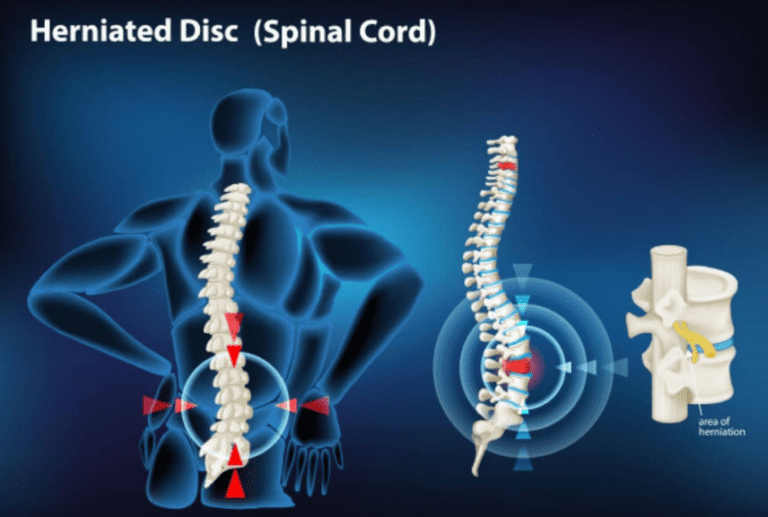
Slip Disc: Understanding, Symptoms, Causes and Management
What is Pain from a Slip Disc?
Pain from a slip disc, also known as a herniated or ruptured disc, occurs when the soft, gel-like center of a spinal disc pushes through a tear in the tougher exterior casing. This can irritate nearby nerves, causing pain, numbness, or weakness in an arm or leg. The pain can vary from a mild ache to severe discomfort, depending on the location of the herniated disc and the extent of nerve compression.
What Are the Major Symptoms?
Identifying the symptoms of a slip disc is crucial for proper diagnosis and treatment. Common symptoms include:
- Back Pain: Persistent or intermittent pain in the lower back, which may radiate to the buttocks, thighs, or legs.
- Leg or Arm Pain: If the herniated disc is in your lower back, you’ll typically feel the most intense pain in your buttocks, thigh, and calf. For herniated discs in the neck, you’ll feel pain in your shoulder and arm.
- Numbness or Tingling: People with a herniated disc often experience radiating numbness or tingling in the part of the body served by the affected nerves.
- Weakness: Muscles served by the affected nerves tend to weaken, which might cause you to stumble, or impair your ability to lift or hold items.
What are the Main Causes?
Several factors can lead to a herniated disc, including:
- Degenerative Disc Disease: As you age, your spinal discs lose some of their water content, making them less flexible and more prone to tearing or rupturing with even a minor strain or twist.
- Injury: A single excessive strain or injury can cause a herniated disc. However, most herniated discs are the result of a gradual, aging-related wear and tear called disc degeneration.
- Lifting Improperly: Using your back muscles instead of your legs to lift heavy objects can lead to a herniated disc.
- Repetitive Motions: Jobs or activities that involve repetitive bending, twisting, or lifting can increase your risk.
- Obesity: Excess body weight puts more stress on the discs in your lower back.
- Genetics: Some people inherit a predisposition to developing a herniated disc.
How to Manage Pain from a Slip Disc?
Managing pain from a herniated disc involves a combination of self-care, medications, and medical treatments:
- Rest and Activity Modification: Avoid activities that worsen pain, and try to rest in positions that provide relief.
- Medications: Over-the-counter pain relievers like ibuprofen or acetaminophen can help. In more severe cases, your doctor may prescribe stronger medications, such as muscle relaxants or narcotics.
- Physical Therapy: A physical therapist can develop a customized exercise program to help you regain strength and improve flexibility.
- Heat and Ice: Applying heat or ice packs to the affected area can help reduce pain and inflammation.
- Epidural Steroid Injections: These can provide longer-lasting pain relief by reducing inflammation around the affected nerves.
- Surgery: In cases where conservative treatments do not relieve symptoms, surgery might be necessary to remove the protruding portion of the disc.
Why Choose SMS Hospital?
At SMS Hospital, we are committed to providing exceptional care for patients suffering from a slip disc. Here’s why you should choose us:
- Expert Team:
- Advanced Diagnostics:
- Cutting-Edge Treatments:
- Patient-Centered Care:
- Comprehensive Rehabilitation:
- Non-Surgical & Minimally Invasive Treatments
Choosing SMS Hospital means opting for a dedicated and professional team committed to your recovery and well-being. Contact us today to schedule a consultation and take the first step towards relieving your slip disc pain.
Recent Posts
- Arthritis 101: A Guide to the Various Types and How They Impact You
- Arthritis 101: A Guide to the Various Types and How They Impact You
- Endoscopic Spine Surgery: Leading the Way in Minimally Invasive Treatments
- Arthritis 101: A Guide to the Various Types and How They Impact You
- Post-Surgical Pain: Your Guide to a Smooth and Speedy Recovery
